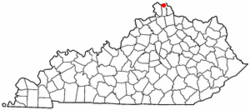Fort Mitchell, Kentucky: Difference between revisions
m r2.7.3) (Robot: Adding uz:Fort Mitchell (Kentucky) |
|||
| Line 151: | Line 151: | ||
[[ht:Fort Mitchell, Kentucky]] |
[[ht:Fort Mitchell, Kentucky]] |
||
[[nl:Fort Mitchell]] |
[[nl:Fort Mitchell]] |
||
[[uz:Fort Mitchell (Kentucky)]] |
|||
[[pt:Fort Mitchell]] |
[[pt:Fort Mitchell]] |
||
[[simple:Fort Mitchell, Kentucky]] |
[[simple:Fort Mitchell, Kentucky]] |
||
Revision as of 03:30, 27 November 2012
Fort Mitchell, Kentucky | |
|---|---|
 Location of Fort Mitchell, Kentucky | |
| Country | United States |
| State | Kentucky |
| County | Kenton |
| Incorporated | February 14, 1910 |
| Government | |
| • Type | Mayor-Council |
| • Mayor | Chris Wiest |
| Area | |
• Total | 3.1 sq mi (8.1 km2) |
| • Land | 3.1 sq mi (8.1 km2) |
| • Water | 0.0 sq mi (0.0 km2) |
| Elevation | 853 ft (260 m) |
| Population (2010) | |
• Total | 8,207 |
| • Density | 2,581.8/sq mi (996.8/km2) |
| Time zone | UTC-5 (Eastern (EST)) |
| • Summer (DST) | UTC-4 (EDT) |
| ZIP codes | 41011, 41017 |
| Area code | 859 |
| FIPS code | 21-28558 |
| GNIS feature ID | 0492355 |
Fort Mitchell is a city in Kenton County, Kentucky, United States, and is part of Greater Cincinnati. The population was 8,207 at the 2010 census.
Geography
Fort Mitchell is located at 39°2′50″N 84°33′36″W / 39.04722°N 84.56000°W (39.047221, -84.559993)Template:GR.
According to the United States Census Bureau, the city has a total area of 3.1 square miles (8.0 km2), all of it land.
Culture
- Fort Mitchell, Kentucky has an annual Fourth of July Parade.
- There are over 120,000 people buried in 3 cemeteries in Fort Mitchell
Education
Fort Mitchell is home to Beechwood Independent School District, a public K-12 institution and Blessed Sacrament, a Catholic K-8 institution. Although Dixie Heights High School has a Fort Mitchell mailing address, it is actually within the city limits of Edgewood. Beechwood High School was ranked #271 on Newsweek magazine's 2012 list of the 1000 best public high schools nationwide.
History
Fort Mitchell was the site of American Civil War fortifications built for the Defense of Cincinnati in 1862 named for General Ormsby M. Mitchel, a professor at Cincinnati College (now the University of Cincinnati).
Fort Mitchell was chartered as a city in 1909.[1]
Demographics
| Census | Pop. | Note | %± |
|---|---|---|---|
| 1910 | 80 | — | |
| 1920 | 169 | 111.3% | |
| 1930 | 359 | 112.4% | |
| 1940 | 705 | 96.4% | |
| 1950 | 372 | −47.2% | |
| 1960 | 525 | 41.1% | |
| 1970 | 6,982 | 1,229.9% | |
| 1980 | 7,297 | 4.5% | |
| 1990 | 7,438 | 1.9% | |
| 2000 | 8,089 | 8.8% | |
| 2010 | 8,207 | 1.5% | |
| U.S. Census Bureau[1] | |||
As of the census of 2010,[2] there were 8,207 people, 3,530 households, and 2,033 families residing in the city. The population density was 2,581.8 people per square mile (997.8/km²). There were 3,744 housing units at an average density of 1,195.0 per square mile (461.8/km²). The racial makeup of the city was 96.87% White, 0.99% African American, 0.10% Native American, 0.80% Asian, 0.02% Pacific Islander, 0.47% from other races, and 0.74% from two or more races. Hispanics or Latinos of any race were 0.85% of the population.
There were 3,446 households out of which 28.9% had children under the age of 18 living with them, 45.2% were married couples living together, 9.3% had a female householder with no husband present, and 42.4% were non-families. 35.6% of all households were made up of individuals and 11.3% had someone living alone who was 65 years of age or older. The average household size was 2.29 and the average family size was 3.05.
The age distribution was 23.9% under 18, 9.9% from 18 to 24, 30.4% from 25 to 44, 22.6% from 45 to 64, and 13.3% who were 65 or older. The median age was 36 years. For every 100 females there were 90.8 males. For every 100 females age 18 and over, there were 86.4 males.
Full 2010 Census economic data for Kentucky locations has not yet been released. As of the 2010 Census, the median income for a household in the city was $46,335, and the median income for a family was $63,910. Full-time male workers had a median income of $41,358 versus $29,873 for females. The per capita income for the city was $29,229. As of the 2000 Census, about 2.6% of families and 3.4% of the population were below the poverty line, including 2.7% of those under age 18 and 2.4% of those age 65 or over.
References
- ^ Historical Census Data Retrieved on 2011-12-30
- ^ Template:GR

